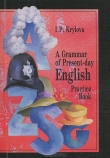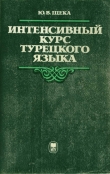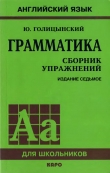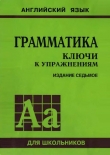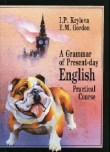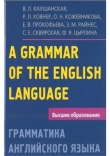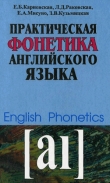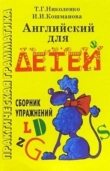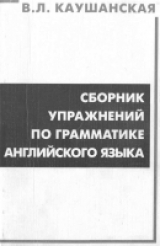
Текст книги "Сборник упражнений по грамматике английского языка"
Автор книги: Валентина Каушанская
Жанры:
Учебники
,сообщить о нарушении
Текущая страница: 16 (всего у книги 20 страниц)
THE CONJUNCTION
Exercise 1. State the morphological composition oi the following conjunctions:
For, as well as, unless, now that, and, neither... nor, while, although, not only... but also, provided, as though, supposing, no sooner... than, or, so that, if, both... and, as long as, so, either... or, as... as, when, until, before, after, as if, as soon as, lest, for fear that, notwithstanding, nor.
Exercise 2. Point out all the coordinating conjunctions and define the group each belongs to.
1. The stranger had not gone far, so he made after him to ask the name. (Dickens)2. Be quick, or it may be too late. (Dickens)3....real accuracy and purity she neither possessed, nor in any number of years would acquire. (Ch. Bronte)4....Mrs. Septimus Small let fall no word, neither did she question June about him. (Galsworthy)5. The river was not high, so there was not more than a two or three mile current. (Twain)6. It seemed to him that he could contrive to secure for her the full benefit of both his life insurance and his fire insurance... (Wells) 7. Karl is solid and extremely certain of himself, while Joseph on the other hand, though no less certain of himself, is a good deal less solid. (Saroyan)8. He could see no one, and he began to believe that either his instinct had deceived him, or else that the shadowing was over. (Greene)9. But for a long time we did not see any lights, nor did we see the shore, but rowed steadily in the dark riding with the waves. (Hemingway)
Exercise 3. Point out all the subordinating conjunctions and say what kind of subordinate clauses they introduce.
1. She stood quite silent while Butler appealed to her. (Dreiser) 2. Since Miss Wilfer rejected me, I have never again urged my suit. (Dickens)3. Whenever I looked at Susan she gave me a frank full-hearted smile. (Braine) 4. So the tiny woman closed the shutter of the cottage window and fastened the door, and trembling from head to root for fear that any one should suspect her, opened a very secret place, and showed the Princess a shadow. (Dickens)5. And yet tired though he was after his three long days, Soames dreaded the moment when the car should stop. (Galsworthy)6. I extinguished my taper, locked my bureau, and left her, since she would not leave me. (Ch. Bronte)7. Once they reached the open country the car leapt forward like a mad thing. (Murdoch)8. He was a tall fellow with a very wide mouth and prematurely bald in front, so that he appeared to have a colossal forehead. (Priestley) 9. The reference was as plain as it was unexpected. (Clark)10. Early as he was, another man was there before him. (Dreiser)11. We're as we're made. (Maugham)12. They were all smiling wid'ely at me as I came toward them. (/. Shaw)13. He was a fattish, worried, untidy man, always looking as if he had slept in the expensive clothes he wore. (Priestley) 14. Mr. Pancks has come down into the Yard to-night, on purpose that you should hear him. (Dickens)15. The most I can say now is that it is very cold in San Francisco, and I am freezing. (Saroyan)16. Give me your promise that this shall be done. (Priestley) 17. In that small room he seemed even bigger than I remembered him. (Maugham)18. Whatever I intend to do I'll do without advice from the outside. (Dreiser)19. Breakfast was not yet over before the men came to put up the marquee. (Mansfield)20. He prized the pencil, because it had been a gift from his mother. (Warren)21. As soon as he had gone, I looked at the clock. (Snow)22. After a sleepless night, he [Cowperwood] wrote his resignation to the chairman of the board of directors, in order that he should be prepared to hand it to him at once. (Dreiser)
THE PARTICLE
Exercise 1. Point out the particles and define the group each belongs to.
1. It is just because I want to save my soul that I am marrying for money. (Shaw) 2. Rosa feared this power, but she enjoyed it too. (Murdoch)3. Oh, doctor, do you think there is any chance? Can she possibly survive this last terrible complication? (Shaw)4, We merely want to see the girl and take her away. (Dreiser)5. I shall also try to be there at ten. (Wells)6. Don't come any nearer. You're at just the right distance. (Bennett)7. He had taken up with it solely because he was starving. (London)8. Soames was but following in the footsteps of his father. (Galsworthy)9. I am interested only in man. Life I love and before death I am humble. (Saroyan)10. Just then the telephone rang. (Snow)11. Tom, you'll manage it and if you do I'll give you something ever so nice. (Twain)12. He needed the peculiar sympathy that a woman alone can give. (Locke)13. She ought to have written at once and told htm exactly what had happened. (Wells)14. I think, he's been a simply perfect father, so long as I can remember. (Galsworthy)15. They did not even look at him. (Faulkner)16. Not a career for a man of his ability. (Galsworthy)17. We followed him along the corridor... He never looked back, he never hesitated. (Collins)
GRAMMATICAL HOMONYMS
Exercise 1. State whether the boldfaced word is an adverb, a modal word, or a particle.
1.
Miss Whitmore was
truly
taken by surprise. (Dreiser)2....the time had come in which she must speak to him
truly
. (Trollope)3. The hall looked
exactly
as it did when he used to dine there with Jack Herring. (Galsworthy)4. My mother knew so
exactly
how to dress. 5. You are coming
right
out into life – facing it all. (Wells)6. She would never persuade them that she had done
right
. (Wells)7. «You will be sure to come?» said Mr. Snodgrass. "Oh,
certainly
." (Dickens)8. Soames smiled.
Certainly
Uncle James had a way with him. (Galsworthy)9. Lammlein rose. «We have fulfilled our obligations,» he said pompously, and yet not quite
certainly
. (Heym)10. Tom, you'll manage it and if you do I'll give you something
ever
so nice. (Twain)11. I don't think I shall ever be afraid of you again, Bessie. (Си. Bronte) 12. Fleur having declared that it was "
simply
too wonderful to stay indoors," they all went out. (Galsworthy)13.-She looked at him
simply
, directly... (Dreiser)14. They
just
came in. They are sitting in number 7 booth. (This is America)15. I'll
just
tap and ask them to come out. (Dreiser)16. I don't know
just
what to do. (Dreiser)17. What are they that they should judge us?
Yet
they do unhesitatingly. (Shaw)18. There was
yet
another source of difference between us. (Dickens)19. But the gentleman had not finished his requests
yet
. (Priestley) 20. «I had another reason for suspecting the deceased woman,» he said, "which appears to me to have been stronger
still."
(Collins)21. He had no purpose in going about the room, but he was not
still
a moment. (Dickens)22....Charlie felt sure that she was
still
somewhere in London. (Priestley) 23. Old Mr. Ablewhite
never
made his appearance that night. (Collins)24. Mrs. Reed was blind and deaf on the subject. She
never
saw him strike or heard him abuse me. (Ch. Bronte)25. To be loved beautifully was
surely
the crown and climax of her being. (Wells)26. Slowly,
surely
, with the secret inner process that works the destruction of an old tree, the poison of the wounds to his happiness, his will, his pride, had corroded the comely edifice of his philosophy. (Galsworthy)27. In turn, each of these brothers was very different from the other, yet they,
too
, were alike. (Galsworthy) 28. They said of him that he was
too
serious. (This is America)
Exercise 2. State whether the boldfaced word is an adverb or a preposition.
1. Somebody
outside
pulled at the door. (Greene) 2.
Outside
it was getting dark. (Hemingway)3. It was a nice little place and he liked the high mountain hauling up
beyond
. (Hemingway)4.
Outside
, and
beyond
the road, lay the Park. (Murdoch)5. There, just
inside
the door, stood a wide, shallow tray full of pots of pink lilies. (Mansfield)6. It was dark
inside
. (Hemingway)7. He wandered
down
the street again. (Lindsay)8. He dressed for dinner early and was first
down
. (Galsworthy)9. I drove back
up
the narrow road. (Hemingway)10. They mounted
up
and
up
, through the musty smell of an old close house, little used, to a large garret bedroom. (Dickens)II. It was just that he had never really looked into a human face
before
. (Warren)12. The afternoon
before
the attack was spent in putting the boats ready.
Exercise 3. State whether the boldfaced word is an adverb, a conjunction, a preposition, or a postposition.
1. They were reluctant to interfere
in
their niece's private affairs. (Lindsay) 2. A cool March air came
in
Part II. SYNTAX
THE SIMPLE SENTENCE
Exercise 1. Define the kinds of sentences according to the purpose of the utterance.
Laura was terribly nervous. Tossing the velvet ribbon over her shoulder, she said to a woman standing by, «Is this Mrs. Scott's house?» and the woman, smiling queerly, said, «It is, my lass.» Oh, to be away from this! She actually said, «Help me God!» as she walked up the tiny path and knocked. To be away from these staring eyes, or to be covered up in anything, one of those women's shawls even! I'll just leave the basket and go, she decided. I shan't even wait for it to be emptied.
Then the door opened. A little woman in black showed in the gloom.
Laura said, "Are you Mrs. Scott?" But to her horror the woman answered, "Walk in, please, miss," arid she was shut in the passage. "No," said Laura, "I don't want to come in. I only want to leave this basket."
The little woman in the gloomy passage seemed not to hear her. "Step this way, please, miss," she said in an oily voice, and Laura followed her. (Mansfield)
Exercise 2. Define the type of question
1. "Who is he?" I said. «And why does he sit always alone, with his back to us too?» (Mansfield)2. «Did she have a chill?» he asked, his eyes upon the floor. (Cronin)3. You have Mr. Eden's address, haven't you, Mr. Ends? (London)4. Is literature less human than the architecture and sculpture of Egypt? (London)5. We shall be having some sort of celebration for the bride, shan't we, Mr. Crawley? (Du Maurier)6. «Can I see the manager?» I said, and added politely, «alone.» (Leacock) 7. When had the carriage been back from taking Miss June to the station? (Galsworthy)8. What is the meaning of that? She is going to live in the house, isn't she? (Galsworthy)9. He couldn't understand what Irene found wrong with him: it was not as if he drank. Did he run into debt, or gamble or swear? (Galsworthy)10. Were you talking about the house? I haven't seen it yet, you know. Shall we all go on Sunday? (Galsworthy)11. Don't you realize it's quite against the rules to have him. (Cronin)12. How will you carry the bill into effect? Can you commit a whole country to their own prisons? (Byron)
Exercise 3. Point out two-member sentences (say whether they are complete or elliptical) and one-member sentences.
1. He stared amazed at the calmness of her answer. (Galsworthy)2. We must go to meet the bus. Wouldn't do to miss it. (Cronin)3. Obedient little trees, fulfilling their duty. (Kahler)4. Lucretius knew very little about what was going on in the world. Lived like a mole in a burrow. Lived on his own fat like a bearin winter. (Douglas)5. He wants to write a play for me. One act. One man. Decides to commit suicide. (Mansfield)6. A beautiful day, quite warm. (Galsworthy)7. «What do you want?» «Bandages, stuff for wounded.» (Heym)8. «How did he look?» «Grey but otherwise much the same.» «And the daughter?» «Pretty.» (Galsworthy)9. And then the silence and the beauty of this camp at night. The stars. The mystic shadow water. The wonder and glory of all this. (Dreiser)10. «I'll see nobody for half an hour, Macey,» said the boss. «Understand? Nobody at all.» (Mansfield)11. «Mother, a man's been killed.» «Not in the garden?» interrupted her mother. (Mansfield)12. Garden at the Manor House. A flight of grey stone steps leads up to the house. The garden, an old-fashioned one, full of roses. Time of year, July. Basket chairs, and a table covered with books, are set under a large yewtree. (Wilde)
Exercise 4. Point out the subject and say by what it is expressed. Translate into Russian.
1. At that moment the postman, looking like a German army officer, came in with the mail. (Mansfield)2. The clock struck eight. There was no sign of any of the other guests. (Huxley) 3. Now, there is something peculiarly intimate in sharing an umbrella. (Mansfield)4. Together we walked through the mud and slush. (Mansfield)5. Something impersonal and humble in that action seemed to reassure the Consul. (Cronin)6. The sight of them, so intent and so quick, gave Bertha a curious shiver. (Mansflied) 7. Eight o'clock in the morning. Miss Ada Moss lay in a black iron bedstead, staring up at the ceiling. (Mansfield)8. Still, the good of mankind was worth working for. (Galsworthy)9. Sometimes the past injects itself into the present with a peculiar force. (Heym)10. Forgetting some things is a difficult matter. (Voynich)11. To cross from one end to the other was difficult because of the water. (Heym)12. «A person doesn't have to be rich to be clean,» Charles said. (Braine) 13. There was an eagerness and excitement in the faces of the men. (Heym)14....and Timothy's was but one of hundreds of such homes in this City of London... (Galsworthy)15. Let's get out quick. It's no good wasting time. (Maugham)16. «Very well,» said Soames, «then we know where we are.» (Galsworthy)17. Now, to go through a stormy night and with wet clothes, and, in addition, to be ill nourished and not to have tasted meat for a week or a month, is about as severe a hardship as a man can undergo. (London)18. She did not know. The «No» was stronger than her craving to be in Frisco's arms and forget this dreary existence. (Prichard)19. The mining industry might make wealth and power for a few men and women. But the many would always be smashed and battered beneath its giant treads. (Prichard)20. Yes, that did sound rather far-fetched and absurd. (Mansfield)21. This, of course, in her present mood, was so incredibly beautiful... She began to laugh. (Mansfield)22. To live on good terms with people one must share their work and interests. (Prichard)23. These three deemed themselves the queens of the school. (Ch. Bronte)24. Who were these people? What are they? (Galsworthy)25. His was the harsh world of reality. No one could walk around his drawing. (Stone)26. Governing the district of Cremmen wasn't turning out to be an easy and pleasant job. (Heym) 27. The firing increased in volume. (Heym)28. High and low all made fun of him. (Thackeray)29. For a woman to look at her best is a point of discipline. (James)30. Your coming home has made me as foolish as a young girl of nineteen. (Abrahams)31. And now his heir and nephew, Thomas Esmond, began to bid for his uncle's favour. (Thackeray)
Exercise 5. State the nature of it. Translate into Russian.
1. It was dusky in the dining-room and quite chilly. (Mansfield) 2 The bell rang. It was lean, pale Eddie Warren in a state of acute distress. (Mansfield)3. Oh! Ohl Oh! It was a little house. It was a little pink house. (Mansfield)4. But in her bosom there was still that bright glowing place. It was almost unbearable. (Mansfield)5. She sat up, but she felt quite dizzy, quite drunk. It must have been the spring. (Mansfield)6. It was marvellous to be made love to like that. (Prichard)7. It is the moon that makes you talk to yourself in that silly way. (Shaw)8. It is very distressing to me, Sir, to give this information. (Dickens) 9. He took the path through the fields: it was pleasanter than the road. (Huxley) 10. If this is liberty, it isn't going to mean a thing. (Heym)11. It was now almost four-thirty in the afternoon. (Dreiser)12. I took a good room. It was very big and light and looked out on the lake. (Hemingway)
Exercise 6. Point oui the predicate and say to what type it belongs.
1. Presently she grew tired of that and looked across at her sister. (Galsworthy)2. You shall have as many dances as you like. I shan't dance with anyone except you End Maxim. (Du Maurier)3. Well, d'you feel any better now? (Priestley) 4. Harry was enjoying his dinner. (Mansfield)5. Alice went on, he ought to stop doing nothing and criticising everybody. (Lindsay)6. Everything is being taken down and used against you. (Lindsay)7. The story will only get repeated and exaggerated. (Du Maurier)8. But I've got to have a word with him. We got to do something about it. (Pnchard) 9. She became bitter and unapproachable. (Thorne) 10. Her marriage was more or less fixed for the twenty-eighth of the month. They were to sail for India on September the fifth. (Lawrence)11. Leila's partner gave a little gasping laugh. (Mansfield)12. You are to go straight to your room. You are to say nothing of this to anyone. (De la Roche) 13. He was a country doctor. He died young. (Sanborn) 14. I began to stammer my apologies. He would not listen to me. (Du Maurier). 15. To walk in this way behind him seemed to Annette already a sufficient marvel. (Murdoch)16. A ship – the Vestris – is reported to be arriving at Joppa. (Douglas)17. Led was having a little new sort of weeping fit daily or every other day. (Wescott) 18. Even now he was able to find a thin excuse for that young idiot. (Kahler)19. Do not delay, there is'no time. Teacher Williams lies dead already. (Buck) 20. The grey house had ceased to be a home for family life. (Buck) 21. Kit had. been told to do nothing in particular. (Lindsay) 22. Lately he'd made efforts to bring the matter up with Brian or Colin. (Lindsay)23. The sky shone pale. (Mansfield)24. These days are finished. They are blotted out. I must begin living all over again. (Du Maurier)25. Next day, by noon, I was up and dressed, and sat wrapped in a shawl by the nursery hearth. (Ch. Bronte)26. And all the while he felt the presence of Pat and had to keep on resisting the impulse to turn round. (Lindsay)27. But Abramovici remained quiet. (Heym)28. Morning broke quiet and hushed, subdued as if holding its breath. (Abrahams)29. There were a number of people out this afternoon. And the band sounded louder and gayer. (Mansfield)30. This has proved surprisingly difficult. (Murdoch)
Exercise 7. Say where the predicate is simple and where it is compound (nominal or verbal).
1. Two young girls in red came by. (Mansfield)2. Demetrius came alive and pressed a flock of inquiries. (Douglas)3. And in many ways along lines you'd more or less approve, I am coming to feel the mill apart of myself. (Lindsay)4. He tried to be both firm and friendly. I've felt dependent on him. (Lindsay)5. He now felt only a confused ache of memory and a growing desire to be home. (Lindsay)6. No one was there to meet Dick. He felt a twinge of disappointment. (Lindsay) 7. There was a silence but not an uncomfortable one. (Braine) 8. He was vaguely aware of his father standing by kitchen-range with his coat off. (Lindsay)9. The day of our wedding came. He was to cal( for me to choose the furniture. (Mansfield)10. A good reliable husband he'd make. And our Alice is a great one for wanting a place of her own. (Lindsay)11. That made all the difference. The room came alive at once. (Mansfield)12. «She sounds serious,» Albertine insisted. «She keeps talking about it.» (Kahler)13. Not even her own children had seen Ma break down. She'd keep a proud face always. (Mansfield)14. My lady keeps a list of the names in a little red book (Mansfield)15. Charlie kept quiet. (Priestley) 16. Cedric Thompson stood a good three inches above me. (Braine) 17. For a moment I stood aghast, peering after her shadowy figure, and wondering what had taken her. (Weyman) 18. And then they sat silent for a few moments together. (Trollope)19. I sat writing letters on a piece of paper with a pencil. (Haggard) 20. And for some time he lay gasping on a little flock mattress, rather unequally posed between this world and the next. (Dickens)21. After many adventures I and a little girl lay senseless in the Bad Lands. (Haggard) 22. He seemed glad to see me. (Du Maurier)23. At that moment everything in her life seemed to be a source of desperate anxiety. (Murdoch)24. You can smile away till you split your cheek, but you still got to do a day's work to earn a day's wages. Apples don't grow on monkey-trees. (Lindsay)25. She grew to know the two elderly men better than any other member of Eden's family. (London)26. Yates grew impatient. (Heym)27. She turned once more to Mr. Godfrey. (Collins)28. Gwendolen turned pink and pale during this speech. (Eliot)29. Mr. Bruff remained to dinner, and stayed through the evening. (Collins)30. Michelangelo remained silent. (Stone)31. I gave up the attempt and went upstairs to unpack. (Braine) 32. Michelangelo's knees went weak. He sat down on his bed. (Stone)33. I looked at the photograph above the mantelpiece and saw my own lace for the first time. (Braine) 34. Giovanni looked crestfallen. (Stone)35. He was beginning to sound really angry. (Murdoch)
Exercise 8. Say where the reflexive pronoun is part of the predicate and where it is an object or a predicative.
1. On my estate, we pride ourselves on other things besides hay. (Erskine) 2. She paused, her eyes never leaving my face. «I shall always blame myself for the accident.» (Du Maurier)3. She raised herself suddenly in the tall chair, and looked straight at him. (Erskine) 4. Dick found himself walking in the direction of his friend Mike's place. (Lindsay)5. It was a Tuesday. My lady wasn't quite herself that afternoon. (Mansfield)6. He felt himself j unusually on edge, unable to maintain the impersonally smug tone of Stephenson. (Lindsay)7. Mrs. Danvers showed herself at last. (Du Maurier)
Exercise 9. Point out the predicative and say by what it is expressed.
1. Annette was completely dazed. (Murdoch)2. Their highest concept of right conduct, in his case, was to get a job. (London)3. I'm five foot eleven in my socks. (Braine) 4. Sally, herself, was quite content for a while to enjoy becoming acquainted with her son, washing and feeding him, taking him for walks in thej bush, singing him to sleep. (Prichard)5. Mr. de Morfe was as; generous and hail-fellow-well-met with them as ever.' (Prichard) 6. I am cold. And I always was such a one for being warm.» (Mansfield)7. Your resemblance to your mother is very striking.] (Murdoch)8. He did not answer. I was aware again of that feeling] of discomfort. (Du Maurier)9. I hated myself. My question had been degrading, shameful. (Du Maurier)10. Their interests were' hers as well as the interests of everybody. (Prichard)11. He's a good chap. He makes you feel it's worth while being alive. I (Lindsay)12. Arrived here, his first act was to kneel down on a| large stone beside the row of vessels, and to drink a copious draught from one of them. (Lindsay)13. Either course seemed unthinkable, without any connection with himself. (Lindsay)14. The nightmare of my life has come true. We are in danger of our lives. We are white people in a Chinese city. (Buck)15. The best thing is for you to move in with me and let the young lady stay with your mother. (Abrahams)16. But she was herself again, brushing her tears away. (Lindsay)17. The rest of the time was yours. (Douglas)18. How do you feel physically? (Ch. Bronte] 19. Who are you? (Shaw)20. The Irish are a philosophic as well as a practical race. Their first and strongest impulse is to make the best of a bad situation. (Dreiser)
Exercise 10. Use the adjective or adverb.
1. Catherine smiled at me very __ (happy, happily) (Hemingway) 2. I felt very __ myself, (good, well) (Hemingway)3. I felt __ when we started, (terrible, terribly) (Hemingway)4. He sounded __ and __. (brisk, briskly; cheerful, cheerfully) (Priestley) 5. It wil sound __. (strange, strangely)' (Dickens)6. The hay smelled __ (good, well) (Hemingway)7. I write English __ (bad, badly); (Ch. Bronte)8. I looked at her __ (attentive, attentively) (Ch. Bronte)9. But don't look __, my little girl. It breaks my heart, (sad, sadly) (Ch. Sront'e) 10. He was looking at me __ and __ (grave, gravely; intent, intently) (Ch. Bronte)11. It [the wine] tasted very __ after the cheese and apple, (good, well) (Hemingway)12. The brandy did not taste __ (good, well) (Hemingway)13. The pistol felt __ on the belt, (heavy, heavily) (Hemingway)14. Silas received the message __. (mute, mutely) (Eliot)15. I thought he looked __ (suspicious, suspiciously) (Hemingway)
Exercise 11. Point out the subjective and the objective predicative and say by what part of speech it is expressed.
1. How do you feel? (Hemingway) 2. The half hour he had with her... left him supremely happy and supremely satisfied with life. (London)3. How to be shown things and make appropriate comments seems to be an art in itself. (Leacock) 4. She had her arms about him, murmuring his name in a pleading question, but he held her away from him. (Wilson)5. From behind the verandah she heard these words: «I don't, Annette.» Did father know that he called her mother Annette? (Galsworthy)6. He did not grow vexed; though I continued icy and silent. (Ch. Bronte)7. John Ferrier felt a different man now. (Conan Doyle) 8. I would suggest that in the meantime we remain perfectly quiet and keep these matters secret even from Oliver himself. (Dickens)9. He [Harper Steger] was not poor. He had not even been born poor. (Dreiser) 10. Gilt held him immobile for only an instant... (Wilson)11. As a gesture of proud defiance he had named his son Francis Nicholas. (Cronin)
Exercise 12. Translate into English, using a compound nominal predicate.
1. Музыка звучала чудесно. 2. Этот цветок хорошо пахнет. 3. Ваши слова звучат странно. 4. Этот огурец горький на вкус. 5. Бифштекс хорошо пахнет. 6. Эта материя груба на ощупь. 7. Вода в этой местности плоха на вкус. 8. Эта нота звучит резко. 9. Я чувствую себя плохо. 10. Она выглядит хорошо. 11. Она чувствует себя хорошо. 12. Она только кажется хорошей. 13. Пирожное хорошее на вид. 14. Свисток прозвучал пронзительно. 15. Эти розы пахнут упоительно.
Exercise 13. Point out the predicate and say to what type it belongs. Translate into Russian.
1. «It's no use,» she said quietly. «I am bound to Morris.» (Prichard)2. Her feet were never bound as the Chinese then bound the feet of their girls. (Buck)3. «I don't want to tell you,» said Galahad. «But you are bound to have it.» (Erskine) 4. «You are not bound to answer that question,» he said to Rachel. (Collins)5. One of them was later sent to board in a missionary school and she was compelled to lose the foot bandages. (Buck)6. When she was sixteen she was a beauty. As the result she was compelled to go to the Emperor's palace. (Buck) 7. I was compelled to idleness. I had to listen to her long monologues on the Japanese. (Buck) 8. My mother was plainly fading. I was increasingly anxious about her. (Buck)9. We were anxious to cooperate. 10. My father gave it to my mother. It is the only possession I was able to save. (Douglas)
Exercise 14. Point out the subject and the predicate.
1. On her going to his house to thank him, he happened to see her through a window. (Dickens) 2. To describe one's character is difficult and not necessarily illuminating. (Murdoch)3. The three on the sofa rise and chat with Hawkins. (Shaw)4. Nothing seemed to matter. (London)5. To be wanted is always good. (Stone)6. Seeing you there will open up a new world. (Murdoch)!. Thereafter I read everything on the subject. I came to know many Negroes, men and women. (Buck)8. Elaine, this Jll-advised behaviour of yours is beginning to have results. (Erskine) 9. Presently all, was silent. They must have gone through the service doors into the kitchen quarters. (Du Maurier)10. The citizens of occupied countries were to be subjugated individually. (Wescoit) 11. It was all wrong this situation. It ought not to be happening at all. (Du Maurier)12. My way is not theirs, it is no use trying to run away from them. (Lindsay)13. No one got the better of her, never, never. (Du Maurier)14. Lewisham stopped dead at the corner, staring in blank astonishment after these two figures. (Wells)15.... We and all the people have been waiting patient for many an hour. (Jerome K. Jerome)16, One cannot help admiring the fellow. (Dickens)17. Then he [Tom] gave a low distinct whistle. It was answered from under the bluff. (Twain)18. The girl [Aileen] was really beautiful and much above the average intelligence and force. (Dreiser)19. This religion did give promise of creating a new society. There all men could be equally valuable as human beings. (Buck)20. We must begin here and now to show. Thus we might prove our difference from those white men. (Buck)
Exercise 15. Explain why the predicate – verb is used in the singular or in the plural.
1. The family
were
still at table, but they had finished breakfast. (Twain)2. There
was
a crowd of soldiers along the fence in the infield. (Hemingway)3.... the band
was
stopped
, the crowd
were
partially
quieted
, and Horatio Fizkin, Esquire, was permitted to proceed. (Dickens)4. Down by the Embankment... a band of unemployed
were trailing
dismally with money-boxes. (Galsworthy)5. The multitude
have
something else to do than to read hearts and interpret dark sayings. (Ch. Bronte)6. The newly married pair, on their arrival in Harley Street, Cavendish Square, London
were
received
by the chief butler. (Dickens)7. There
was
a dreaminess, a preoccupation, an exaltation, in the maternal look which the girl could not understand. (Hardy)8. The company
are
cool and calm. (Dickens)9. As of old, nineteen hours of labour a day
was
all too little to suit him. (London)10. There
were
still two hours of daylight before them. (Aldington)11. At last they came into a maze of dust, where a quantity of people
were tumbling
over one another... (Dickens)12. Tom's whole class
were
of a pattern-restless, noisy and troublesome. (Twain)13. A group of men
were standing
guarded by carabinieri. (Hemingway)14. The loving couple
were
no longer happy. (Reade)
Exercise 16. Use the appropriate iorm of the verb.
1. Huckleberry's hard pantings __ his only reply, (was, were) (Twain)2. There __ many a true word spoken in jest, Mr. Cokane. (is, are) (Shaw)3. Each of us __ afraid of the sound of his name, (was, were) (Bennett)4. On such meetings five minutes __ the time allotted to each speaker, (was, were) (London)5. Neither his father nor his mother __ like other people... (was, were) (Dreiser)6. It was dark and quiet. Neither moon nor stars __ visible. (was, were) (Collins) 7. Plenty of girls __ taken to me like daughters and cried at leaving me... (has, have) (Shaw)8. He and I __ nothing in common, (has, have) (Galsworthy)9. But I wonder no wealthy nobleman or gentleman __ taken a fancy to her: Mr. Rochester, for instance, (has, have) (Ch. Bronte)10. To be the busy wife of a busy man, to be the mother of many children ... __, to his thinking, the highest lot of woman, (was, were) (Trollope)11. Her family __ of a delicate constitution, (was, were) (E. Вгопte)12. Hers __ a large family, (was, were) 13. «Well,» says my lady, « __ the police coming?» (is, are) (Collins)14. Nobody __ I am here, (knows, know) (London)15. But after all, who __ the right to cast a stone against one who __ suffered? (has, have; has, have) (Wilde)16. There are men who __ dominion from the nature of their disposition, and who __ so from their youth upwards, without knowing... that any power of dominion belongs to them, (exercises, exercise; does, do) (Trollope)17. Plain United States __ good enough for me. (is, are) (London)18. He half started as he became aware that someone near at hand __ gazing at him. (was, were) ((Aldington)19. Fatting cattle __ from 5 to 10 gallons of water a head daily, (consume, consumes) (Black) 20. She is supposed to have all the misfortunes and all the virtues to which humanity __ subject, (is, are) (Trollope)21. It was a market-day, and the country people __ all assembled with their baskets of poultry, eggs and such things... (was, were) (Thackeray)22. The precept as well as the practice of the Primitive Church __ distinctly against matrimony, (was, were) (Wilde)23....Ratterer and Hegglund..., as well as most of the others, __ satisfied that there was not another place in all Kansas City that was really as good, (was, were) (Dreiser)24. Twelve years __ a long time, (is, are) (Galsworthy)25. There __ a great many ink bottles, (was, were) (Dickens)26. May and I – just friends, (is, are) (Keating) 27. The bread and butter __ for Gwendolen, (is, are) (Wilde)28. I am afraid it is quite clear, Cecily, that neither of us __ engaged to be married to anyone, (is, are) (Wilde)29. It __ they that should honour you. (is, are) (Trollope) 30. Great Expectations by Dickens __ published in I860, (was, were) 31. The family party __ seated round the table in the dark wainscoted parlour... (was, were) (Eliot)32. Everybody __ clever nowadays, (is, are) (Wilde)33. There __ a number of things, Martin, that you don't understand, (is, are) (Wilde)34. The number of scientific research institutes in our country __ very large. (is, are) 35. Her hair, which __ fine and of medium brown shade, __ brushed smoothly across the top of her head and then curled a little at each side, (was, were; was, were) (Priestley) 36. After some apologies, which __ perhaps too soft and sweet... the great man thus opened the case, (was, were) (Trollope)37. It was as if the regiment __ half in khaki, half in scarlet and bearskins: (was, were) (Galsworthy)38. Youth and Age __ a weekly, and it had published two-thirds of hjs twenty-one-thousand-word serial when it went out of business, (was, were) (London)39. There __ a number of men present, (was, were) (Walpole) 40....the flowers came in such profusion and such quick succession that there __ neither time nor space to arrange them, (was, were) (Heytn)
